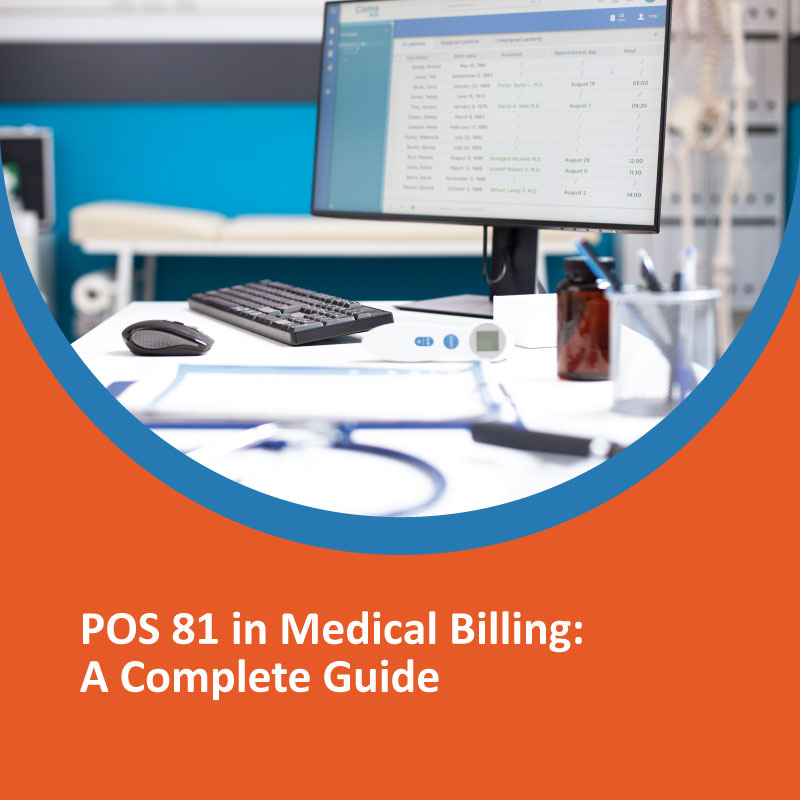Understanding billing codes is essential for healthcare providers. One such important code is POS 81 in medical billing. This code is often overlooked but plays a key role in claim submissions and insurance reimbursements.
In this article, we’ll explain what POS 81 medical billing means, when to use it, how it affects payments, and why accuracy is important. Whether you’re a healthcare provider, biller, or medical office manager, this guide will help you avoid mistakes and ensure proper reimbursements.
You may read: Medical Billing and Collection: A Complete Guide for Healthcare Providers
What Does POS 81 Mean in Medical Billing?
POS stands for Place of Service. It is a two-digit code used on claims to tell the insurance company where the healthcare service was provided. These codes help determine the type of facility and how much the insurance will pay.
POS 81 refers to an Independent Laboratory. When a test or service is performed by a laboratory that operates independently (not connected to a hospital or clinic), POS code 81 should be used on the claim.
POS 81 Medical Billing Definition
To put it simply, POS 81 medical billing means you are billing for services performed in an independent lab. This type of lab is separate from doctor’s offices and hospitals. It performs diagnostic tests, often for multiple providers.
If a blood test, urine test, or other diagnostic service is done at such a lab, the medical bill should include POS 81.
When Should You Use POS 81?
You should use POS 81 in the following situations:
- A test is sent to an external lab that is not owned or operated by the provider or hospital.
- The lab performs the test at its own facility and returns the results.
- The lab is licensed and classified as an independent laboratory under federal regulations.
Examples:
- A primary care doctor collects a blood sample and sends it to an outside lab for testing. The lab processes the sample and sends the results back. The lab will bill with POS 81.
- A patient visits a diagnostic lab (not part of a hospital) for a COVID-19 PCR test. The billing will include POS code 81.
Using the right place of service code like POS 81 ensures that insurance claims are processed correctly.
Why Is POS 81 Important in Medical Billing?
Using the correct POS code can affect whether a claim is paid or denied. POS codes help insurance companies understand:
- Where the service was performed
- Which payment rates apply
- If the provider meets the requirements for reimbursement
Incorrect use of POS 81 may lead to:
- Claim denials
- Delayed payments
- Compliance issues
- Audit risks
POS codes are not just formality—they directly impact revenue.
Common Errors with POS 81
Here are some mistakes often seen in billing with POS 81:
1. Using POS 81 for Hospital-Based Labs
Hospital labs are not independent labs. They usually fall under POS 22 (Outpatient Hospital) or POS 21 (Inpatient Hospital).
2. Using POS 81 for Physician Office Labs
If the lab is part of a physician’s practice and testing is done in-house, POS 11 (Office) is typically used—not 81.
3. Billing Without the Right Lab Certification
Only labs that meet independent lab status can bill with POS 81. Using this code without proper licensing may lead to rejected claims or audits.
4. Failing to Match POS with Provider Type
If the billing provider is a physician or hospital, and not the lab itself, POS 81 may be inappropriate.
How POS 81 Affects Reimbursement
Medicare and many private insurers pay different rates based on the place of service. When POS 81 is correctly used:
- The lab receives payment under the Clinical Laboratory Fee Schedule (CLFS).
- It is paid separately and not as part of any facility payment.
- Reimbursement is usually based on the test performed and geographical rate settings.
Improper POS coding can result in underpayments or complete rejections. That’s why it’s important for medical billing staff to be well-trained on POS codes like 81.
Billing Guidelines for POS 81
To ensure clean claims, here are a few best practices when billing with POS 81:
- Verify that the laboratory is CLIA-certified and registered as an independent lab.
- Ensure the provider billing is actually the lab performing the test—not just the ordering physician.
- Use appropriate CPT codes for the specific tests performed.
- Include proper documentation if required by the insurance payer.
- Double-check claim forms for accurate patient, diagnosis, and insurance information.
POS 81 and Medicare
For Medicare billing, POS 81 must be used carefully. Medicare has specific rules about:
- Test coverage
- Frequency limitations
- Documentation needs
Claims with incorrect POS codes may be denied or flagged. To avoid problems, always follow Medicare’s lab billing guidelines when using POS 81.
POS 81 vs Other POS Codes
Here’s a quick comparison of POS 81 and other related codes:
| POS Code | Description | When to Use |
| 11 | Office | Services are done in a doctor’s office |
| 19 | Off-Campus Outpatient Hospital | Outpatient hospital service at a satellite site |
| 22 | On-Campus Outpatient Hospital | Outpatient services within the hospital campus |
| 81 | Independent Laboratory | Tests done at a stand-alone diagnostic lab |
Who Needs to Understand POS 81?
- Billing and coding professionals: To ensure clean claims and accurate coding
- Laboratory administrators: To comply with licensing and billing rules
- Physicians and providers: To understand the right use of referral labs
- Revenue cycle teams: To manage collections and avoid denials
Conclusion
POS 81 in medical billing is more than just a code—it’s a critical part of accurate claims processing. It tells insurers where a test was performed and helps ensure proper reimbursement. For independent labs, using POS 81 correctly can protect revenue and support compliance.
Whether you are a biller or a healthcare provider, understanding POS 81 medical billing will help you avoid costly mistakes and speed up payment timelines. Always double-check your claims, stay updated with payer rules, and don’t underestimate the value of correct POS coding.
FAQs about POS 81 in Medical Billing
1. What is POS 81 used for in medical billing?
POS 81 is used to indicate that a service or test was performed at an independent laboratory.
2. Is POS 81 the same as a hospital lab?
No. Hospital labs use other POS codes like 21 or 22. POS 81 is only for independent, stand-alone labs.
3. Can a doctor’s office use POS 81?
No. Doctor’s offices usually bill with POS 11. POS 81 is only for certified independent labs.
4. What happens if POS 81 is used incorrectly?
Claims may be denied, delayed, or flagged for audit if the POS code does not match the provider type or location.
5. Does POS 81 affect reimbursement?
Yes. POS 81 is tied to specific fee schedules. Using it correctly ensures accurate payment for lab services.



